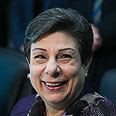
Palestinian authority strengthens ties with Egypt
New tensions between Israelis and Palestinians rise as Palestinians and Egypt tighten bonds, criticize Israel; Egypt minister visits Ramallah
“We support the will and choices of the Egyptian people, and confirm our support to the Egyptian leadership and the Egyptian army in their quest to overcome the current crisis and implement the road map in the future,” Palestinian foreign minister Riad Malki told a press conference here. “We will continue in our efforts to fold this black page confirming Egypt’s pioneer role in this area.”
Related stories:
- Egyptian lawyer who 'spoke Hebrew' suspected of espionage
- Egypt's Tamarod movement: Cancel peace deal with Israel
- World unites against Egypt violence
The “black page” refers to the ongoing rivalry between Abbas and Malki’s Fatah, which controls the West Bank, and the Islamist Hamas, responsible for the Gaza Strip. Egypt has long pushed for “national reconciliation” between the two rival groups which would lead to new Palestinian elections.
Fahmi’s visit to Ramallah came as Israeli troops killed three Palestinians in a clash in the nearby Qalandiya refugee camp. An Israeli army spokesman said troops who came to arrest a newly-released Palestinian were attacked by 1500 youths throwing stones and Molotov cocktails. The troops opened fire killing three Palestinians and wounding 15 others, several critically.
Thousands of Palestinians attended the funeral and Palestinians sharply criticized Israel.
“Israel’s use of excessive and indiscriminate violence and live ammunition in densely populated civilian areas represents a blatant violation of international and humanitarian law,” Palestinian Executive Committee member Hanan Ashrawi said in a statement. “We call on the members of the United Nations Security Council, the Quartet and the rest of the international community to take serious measures to bring an immediate end to the killing of innocent civilians and to terminate Israel’s impunity."
Palestinian officials said that in response to what they called “the attack” in Qalandiya, they had postponed a session of the Israeli-Palestinian negotiations that were supposed to take place in the West Bank town of Jericho. Israeli officials refused to confirm the cancellation.
“We never announced the talks and so we don’t have to announce the cancellation,” Israeli government spokesman Mark Regev told The Media Line. “Since the beginning we have never talked about when they’re scheduled and when they’re not.”
Regev also defended Israel’s actions in the Qalandiya refugee camp.
“I hope we reach a situation where it will no longer be necessary for Israeli forces to go in to places like Kalandia in search of people who are perpetrating violence and terrorism,” he said.
'Egyptian attitude has changed'
Fahmi’s visit to Ramallah also highlighted the changing Egyptian relationship with the Palestinians. Hamas is an offshoot of the Muslim Brotherhood and warmly welcomed the election of former Egyptian leader Mohamed Morsi. But since Morsi was forced to step down, and the Egyptian military have taken over, relations have cooled. Egypt has sealed hundreds of tunnels between Gaza and Egypt to cut down on weapons smuggling.
“The Egyptian situation has changed. We need to study and asses that in a serious and objective way from a national point of view,” Fahmi told The Media Line. “ Hamas exists in the Gaza Strip, in particular. And it’s only natural that we have contacts and arrangements. This means that we disagree on some points and might agree on others. Our position and goals and our external relations is not linked to an Egyptian agenda, but our main goal is to achieve the Palestinian-Palestinian reconciliation, and also the establishment of the Palestinian state.
Palestinian analysts said it was clear that relations with Hamas have changed.
"This visit means that the Egyptian regime is supporting the Palestinian people and not Hamas, that Egypt is supporting the Palestinian Authority and not Hamas," Al-Quds professor Rafiq Awad told The Media Line. He said Egypt wanted to send a message to the Palestinians that it doesn't believe the attempts to demonize them, "despite the provocations and problems between Hamas and the new Egyptian regime, the Egyptian leadership wanted to confirm that it's still holding its responsibility as a leader of the Arab world."
Article by Diana Atallah and Linda Gradstein
Reprinted with permission from The Media Line
- Receive Ynetnews updates directly to your desktop










